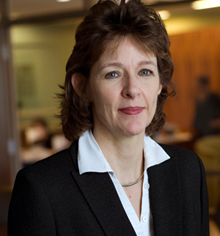
Emory medical ethicist Kathy Kinlaw has made a career out of talking about things that people don't want to talk about—but need to.
She admits that April 16, National Healthcare Decisions Day, came and went without much notice. Most people don't want to think or talk about health care decisions. Kinlaw does.
"Every day in every hospital nationwide, individuals very like you and me are admitted with a serious illness," she says. "Those who have experienced this, or cared for someone who has, know that the very real medical decisions faced can be heart-rending." And few of us want to think about these decisions.
"We do not want to talk about critical illness or to contemplate those places of finitude from which we may not return," Kinlaw, associate director of the Emory University Center for Ethics and director of the center's program in health sciences and ethics, says. "And yet, what we may gain and give to our loved ones—by courageously thinking about and talking about these difficult realities—is compelling."
In her work with patients, families and healthcare professionals, Kinlaw knows firsthand the struggles people face with difficult decisions about medical care near the end of life.
It is hard work, she says, "for it does not entail simply saying yes to every potential intervention. 'Do everything' is not a meaningful request or response in shared decision making."
For example, "there are times when trying a treatment is quite reasonable, even when we are unclear about the outcome," she says. "And there are times when it is reasonable, perhaps deeply 'right,' that one’s life goals will be better served by not trying the next research protocol or invasive intervention, but focusing instead on the quality of the life one has yet to live."
Kinlaw points to one 2010 study of patients with lung cancer, in which those who received palliative care—care whose purpose is to keep patients comfortable, focus on quality of life and address patients' needs as "whole persons" rather than just physical bodies—experienced less pain, better function in everyday life and lived on average more than three months longer than those receiving curative therapy only.
"We need to think carefully about what we really want and be empowered to work with our health care team to make well-informed decisions," she says.
"Our loved ones also benefit from such thoughtful choices," Kinlaw points out. One recent study she cites indicates that 60 percent of respondents say that making sure their family is not burdened by tough decisions is “extremely important.” Yet 56 percent had not communicated their end-of-life wishes.
When a family member of other "surrogate" decision maker is asked to make decisions, their accuracy in predicting treatment choices of the patient if highly variable, somewhere between 50 and 74 percent in one study Kinlaw cites.
"We can do better in clarifying our values and choices and empowering and supporting our family members in understanding the choices we make," she says.
"I have learned that we can rarely predict the exact medical decisions we will face," says Kinlaw. "But what we are capable of is:
- Actively partnering with our physicians and other health care professionals to talk about our underlying goals for treatment and for life,
- Learning about the range of choices we may face, and
- Accepting the fact that there are limits to what medicine can actually do."
In the days following National Healthcare Decisions Day, Kinlaw urges everyone to:
- Have the conversation with family and other loved ones.
- Consider creating an advance directive–contact a local bioethics center, hospital association or hospital.
- Talk to your physician or other health care provider; keep talking with them.
"Advance care planning," as it is often termed, does not just mean completing an "advance directive" document, though you may wish to do so, says Kinlaw. "Advance care planning really asks each of us to think deeply about our values and beliefs and to consider what health care choices will best reflect who we are and those values we hold most closely. "
In one sense, for Kinlaw every day is National Healthcare Decisions Day.
